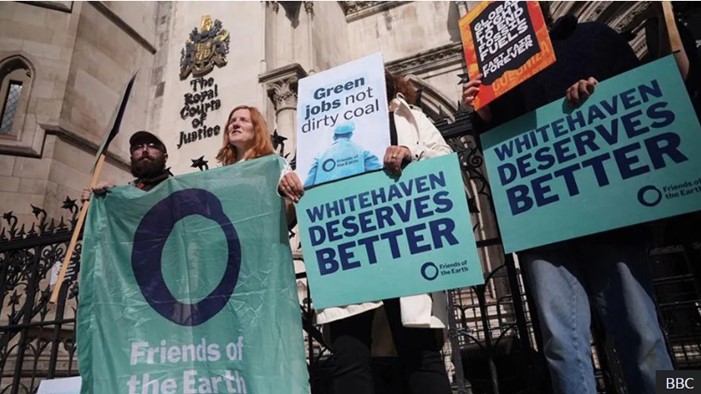
High Court Blocks Plans for UK's First Deep Coal Mine in Over 30 Years
The UK's plan to open its first deep coal mine in more than three decades has been halted by the High Court. Legal challenges brought forward by Friends of the Earth (FOTE) and South Lakes Action on Climate Change (SLACC) argued that the government failed to consider the environmental impact of burning the coal from the proposed Whitehaven mine in Cumbria. Justice Holgate ruled that the assumption the mine would not increase greenhouse gas emissions was "legally flawed."
Campaigners have hailed the ruling as a significant victory for the environment. Victoria Marsom from FOTE described the win as "massive," while West Cumbria Mining (WCM), the company behind the project, said they would "consider the implications" before commenting further.
The legal case centered around the government's approval of the mine in 2022. The claimants argued that the environmental consequences of burning the coal, rather than just operating the mine, were not fully taken into account. WCM defended the project, claiming it would have a "broadly neutral effect" on global emissions. However, Justice Holgate rejected this argument, stating that the belief the mine would be "net zero" in emissions was flawed.
Duncan Pollard, a trustee at SLACC, expressed relief at the decision, urging for the proposal to be permanently shelved. He called for a focus on "secure and sustainable jobs" in the region, rather than reliance on coal mining.
Rebecca Willis, a professor of energy and climate governance at the University of Lancaster, welcomed the ruling, hoping it would set an example for other countries. She stressed that new coal mines are incompatible with climate targets, echoing concerns that such projects undermine the UK's international standing on climate action.
The case follows a similar judgment earlier this year concerning the Horse Hill oil well in Surrey. The Supreme Court ruled that the local authority's approval of the project was unlawful because it did not consider the emissions from burning the extracted oil, a precedent that influenced this case.
FOTE's senior lawyer, Niall Toru, argued that the mine "should never have been given permission" and that the judgment could have international implications, as other countries are facing similar legal battles over fossil fuel projects. SLACC's Maggie Mason agreed, calling the decision "ground-breaking" and a potential catalyst for the global phase-out of fossil fuels.
The Labour government, elected this year, chose not to defend the previous administration's decision to approve the mine, citing a legal error. WCM, however, continued to fight for the project, claiming it could develop a "net zero" coal mine. The company had planned to extract metallurgical coal, used in steel production, but environmental groups pointed to a lack of significant demand for the coal in the UK.
While environmentalists celebrated the ruling, local political leaders expressed disappointment. Mike Starkie, the former Conservative mayor of Copeland, called the decision "devastating" for the local economy, citing the potential for 500 direct jobs and infrastructure improvements. Former Conservative MP Mark Jenkinson argued that importing coking coal from countries like Russia could be the result of blocking the Whitehaven mine.
Environmental group Uplift, which is involved in a separate legal challenge against new North Sea oil and gas licences, countered these claims. Tessa Khan from Uplift emphasized that the notion fossil fuels must be produced locally or imported from other countries is "poorly evidenced."
The ruling marks a significant moment in the UK's ongoing debate over fossil fuel projects, underscoring the increasing pressure to align national policies with climate science and the push for renewable energy alternatives.